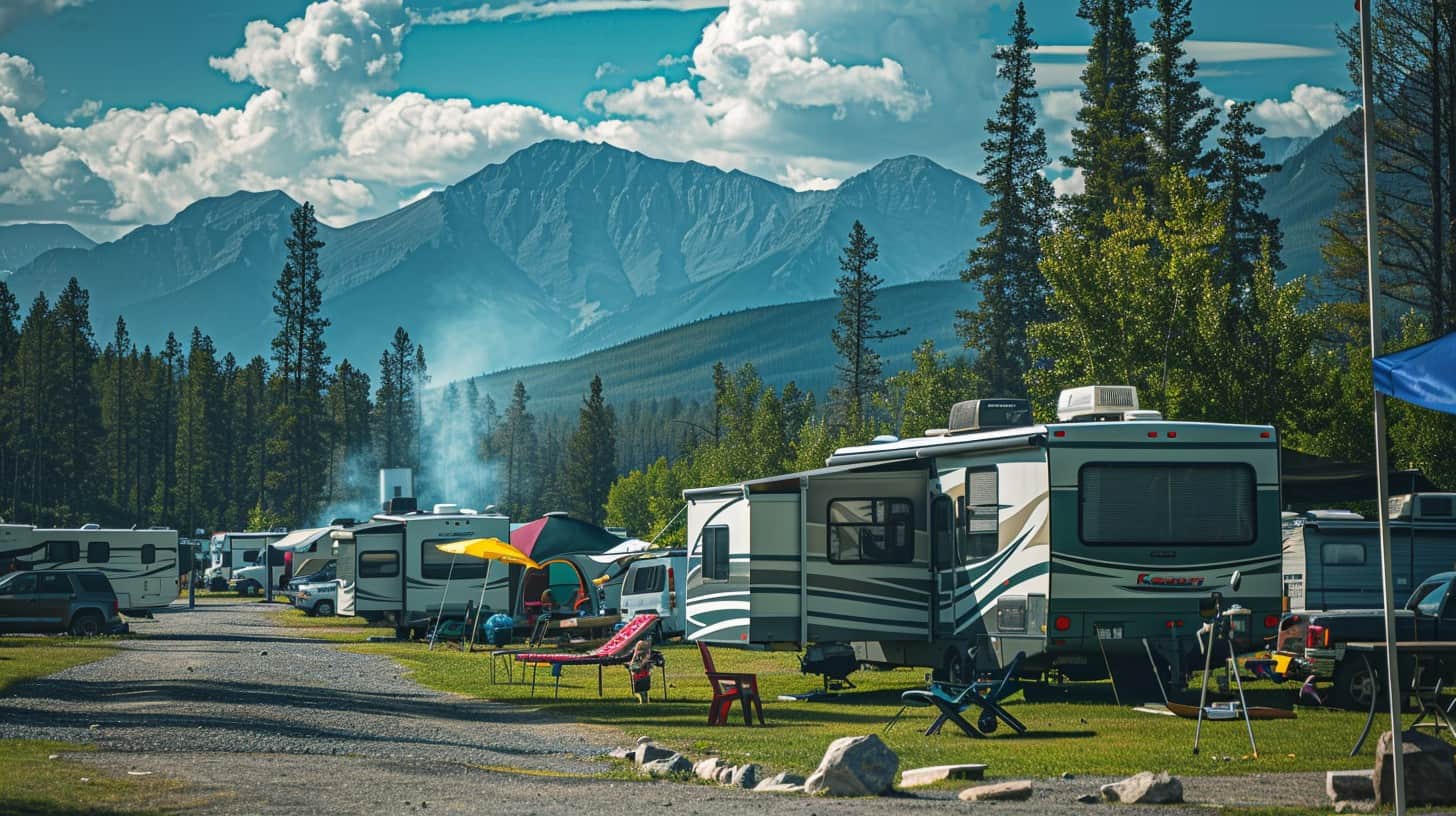Deciding on a travel partner for your road trip can be tricky. Did you know, RVs and campers have their own perks depending on the adventure? This article breaks down the differences, helping you make the perfect choice.
Ready to roll?
Key Takeaways
RVs offer a home-on-wheels experience with more space and comfort, like kitchens and living areas, making them great for larger groups or those wanting luxury on the road. They don’t need another vehicle to move, but can be harder to drive and cost more in fuel.
Campers are smaller, hook to your car or truck, and cost less than most RVs. They’re easier to maneuver and park, but have limited space and amenities. Perfect for adventurers who want simplicity and closer encounters with nature.
Class A, B, and C motorhomes vary in size from big luxury buses to compact vans. Each type has its own benefits, such as Class A’s ample space or Class B’s ease of driving.
Travel trailers come in different types, like pop-up campers which are lightweight and easy on the budget; fifth wheel campers offer more luxury but require a special hitch for towing.
Picking between an RV or camper depends on your travel style, budget, how many people are traveling with you, what comforts you need on the road,
Table of Contents
Defining RVs
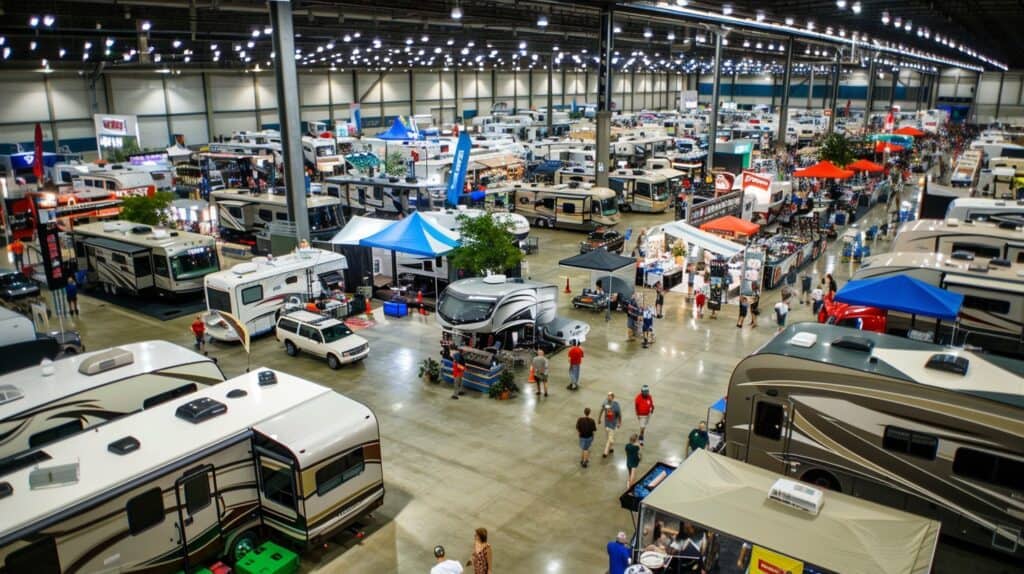
RVs, short for recreational vehicles, are like your home on wheels. They come in various shapes and sizes, from luxury buses fit for a king to cozy little spaces that have just what you need.
Class A RV Motorhome
Class A RVs sit at the top of the luxury RV food chain. They’re like your rolling castle, packed with all you need to travel in style—think big, think fancy kitchens, plush bedrooms, and living areas that could rival a cozy apartment.
These behemoths are perfect for those who love their space or have a bigger crew tagging along for the ride.
These machines aren’t just about looks; they come equipped with power systems that can handle everything from your smartphone to air conditioners—all so you don’t miss a beat of comfort on the road.
Solar panels on top keep things green and efficient. Imagine driving through Salt Lake City, Utah, with your home hitched behind—you’re not just camping; you’re adventuring in luxury.
Plus, no need for a special license to drive these giants, despite their size. So gear up, grab your camping gear without worrying about parking space or power outlets—your Class A motorhome has it all covered.
Class B RV Motorhome
Shifting gears from the bigger Class A, let’s talk about the Class B RV Motorhome, or as you might know it, the camper van. These are the little brothers in the family of motorhomes.
They’re sleek, they’re nimble, and boy, can they zip through traffic like a knife through butter! Picture driving something that feels almost as easy as your SUV but comes with a bed and kitchen in the back.
These camper vans pack a punch for their size. You get everything you need – a place to crash after a long day on the road, your own food station on wheels, and most importantly, an easier time finding parking at campsites or squeezing into those tight spots at boondocking locations.
Plus, they’re stellar when it comes to fuel efficiency. Less gas means more money for adventures (or snacks; no judgment here). So if cruising without dragging along an entire house sounds appealing – meet your perfect match: The Class B motorhome.
Class C RV Motorhome
Moving on from the snug Class B, let’s talk about the Class C RV motorhome. It finds the sweet spot for those wanting more room without driving a beast down the highway. Think of it as your home on wheels with enough space to stretch out but not so big that you dread parking it.
They’re built with families in mind, offering extra sleeping spots above the driver’s area and slide-out sections for even more elbow room. Plus, setting up camp becomes a breeze.
For folks eyeing an adventure that feels both cozy and spacious, Class Cs are the ticket. Imagine cruising towards Zion National Park or plotting an RV Salt Lake City trip; these rigs make such dreams hassle-free.
You can tow your car behind for local jaunts without unhooking your whole setup at every stop—handy, right? Their compact size hides a surprising amount of living space inside, complete with all the amenities: kitchen for roadside meals, comfy beds after long treks, and sometimes even solar panels to power your gadgets off-grid.
Let’s gear up—in this case, hitting the road doesn’t mean leaving comforts behind.
Defining Campers
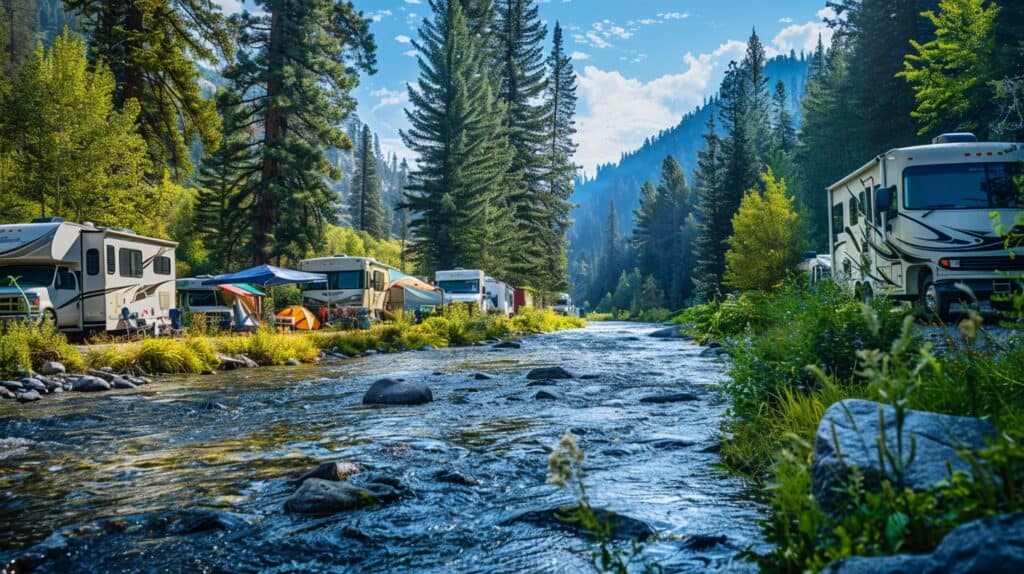
Campers are like turtles; they bring their homes wherever they roam. From hitched houses to foldable forts, each has its own charm and challenge.
TOY HAULERS
Toy haulers are the powerhouse of the RV world. Think of them as having a mobile garage merged with a living suite, offering a striking balance between mobility and comfort. These haulers stand out because they work as a fully functional RV while offering a transport solution for adventure gear like dirt bikes, ATVs, and kayaks.
Up front, you have a full RV setup with kitchens, beds, and baths. They’re less cumbersome than a full-sized RV but more equipped than your typical camper. In the back, a robust ramp door swings down to easily unload your gear.
The best part about toy haulers is their versatility. After you unload your gear, you can convert the garage into an additional sleeping quarter, a dining area, or an entertainment room.
Travel Trailer
Travel trailers are the Swiss Army knives of the camper world. They come in flavors like fifth wheels, truck campers, and pop-up campers. Each type serves a unique need on the road—fifth wheels bring the comfort and space of home, while pop-ups are all about hitting that sweet spot between affordability and convenience.
Imagine hitching your life to the back of your car—travel trailers make that possible. You’ve got options ranging from spacious family cabins on wheels to minimalist setups for solo adventures.
Plus, they’re less of a gas guzzler than their motorized cousins, making every mile count. Whether it’s a weekend at a campground or an epic cross-country journey, these bad boys turn trips into adventures without breaking the bank or needing a commercial flyer’s license to drive.
Pop-Up Camper
Pop-up campers are like the Swiss Army knives of the camper world. They’re light, easy to tow, and wait for it. they fold up! Imagine being able to hit the road without feeling like you’re dragging a mini-house behind you.
Plus, once you unhook your pop-up at the campground, your vehicle is free to explore wherever – talk about flexibility.
Here’s the kicker: pop-ups are kind on your wallet. Not only do they come with a smaller price tag than their RV cousins, but their need for upkeep is pretty minimal too. So if you love camping trips but don’t want to break the bank or deal with a high-maintenance lug-around, a pop-up camper might just be your ticket to happy trails.
Fifth Wheel Camper
Fifth wheel campers are the big shots of the camper world, offering a slice of luxury on wheels. They’re like your home away from home, but with the ability to hitch up and hit the road whenever you hear adventure calling.
Equipped with all the necessities—think rolling kitchen, cozy living space, and sometimes even a small washroom—they make sure comfort is always part of your journey.
However, they do come with their set of challenges. For starters, you’ll need a specific towing hitch that matches their unique design—not just any truck can handle these beasts.
And let’s not forget about finding a parking spot big enough for these spacious rigs at campgrounds or anywhere else you’re planning to park for the night. But hey, if space and comfort are what you’re after on those long-haul trips, then navigating these little hiccups is well worth it.
Key Differences between RVs and Campers
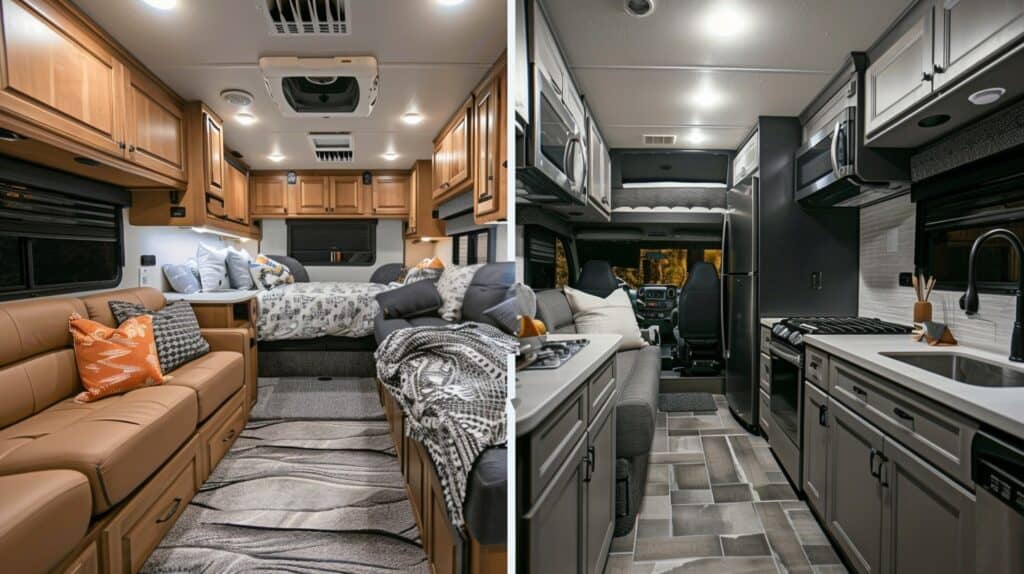
People often use RVs and campers interchangeably. However, these two refer to different types of functions and accommodations. Their main difference lies in their drivability. RVs are motorized living quarters that travelers can drive from place to place. On the other hand, campers require a separate vehicle for towing or carrying. They will need something powerful, like a truck or SUV with sufficient towing capacity.
RVs tend to be spacious and fully equipped with amenities like kitchens, bathrooms, living areas, and, in some units, entertainment systems. Whether you’re going for Class A, B, or C, an RV will provide you with the comfort you can find at home. Campers can also offer kitchen and sleeping areas, but compared to RVs, they’re more compact. Often, they’re designed to be more minimalist and functional, focusing only on the essentials needed for camping and traveling.
RVs are generally more expensive because of their size, amenities, and the inclusion of motorized systems. Campers are typically more affordable than most RVs. Their smaller size and fewer amenities make them a budget-friendly option.
Pros and Cons: RVs
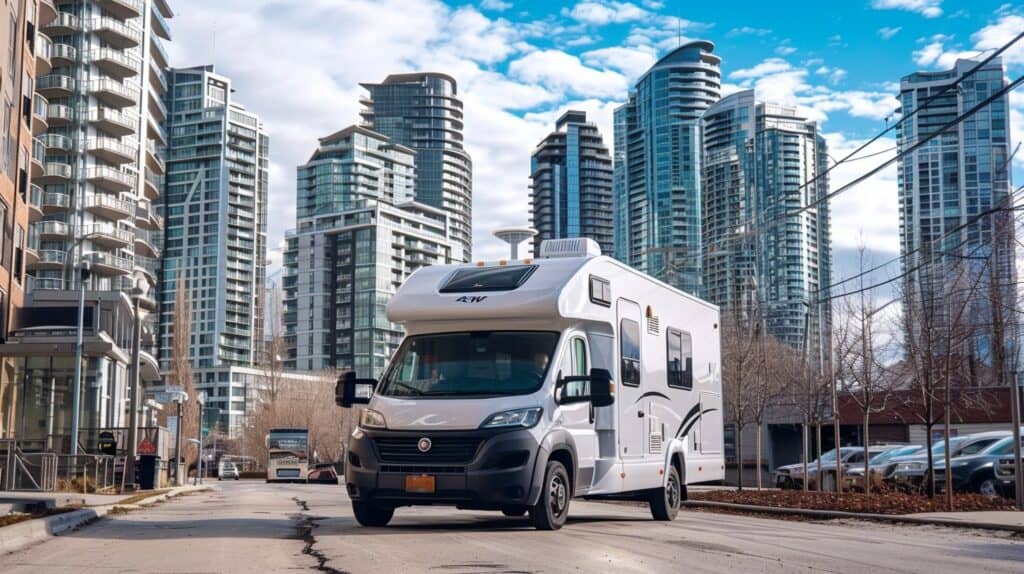
RVs, those big, comfy homes on wheels, come with their own set of ups and downs. On the bright side, they’re like a luxury hotel room that moves. Imagine having your bed, kitchen, and living area all in one place while you explore new places! Plus, some RVs are so fancy they make you feel like a millionaire on wheels.
But it’s not all sunshine and rainbows. These motorhomes can be tricky to drive through narrow city streets or tight camping spots. And let’s talk about gas – filling up these beasts can cost a pretty penny.
So, if you’ve got an itch for adventure but still want the comforts of home. read on! This ride is just getting started.
Benefits of Owning an RV
Owning an RV is like holding the keys to adventure. You can take off whenever you want, making any spot your home for the night.
- Flexibility on the road: Imagine being able to sleep under the stars one night and parking by a roaring river the next. RVing offers this freedom, allowing travel anywhere from sandy beaches to mountain peaks.
- Home comforts everywhere you go: With an RV, you don’t have to say goodbye to comfort just because you’re on the road. Many come equipped with kitchens, bathrooms, and cozy sleeping areas.
- Ready for action: Love boats or bikes? Most RVs can tow your favorite “toys,” letting you bring along whatever makes your trip exciting.
- Save money on trips: Forget booking hotels or eating out all the time. An RV lets you cook your own meals and sleep in your own bed, cutting down on travel costs.
- Meet new people: The RV lifestyle introduces you to a community of fellow travelers who share stories and tips at campsites or online.
- Easy setup: Upon reaching your destination, there’s no need for tents or booking rooms; just park, and you’re ready to relax or explore.
- Adaptable for solo trips or family adventures: Whether you’re going alone or with loved ones, there’s an RV size and style that fits every need.
- Bring power wherever you go: With built-in electrical systems, some capable of solar power integration, staying charged isn’t a hassle—whether watching TV or keeping lights on at night.
- Less upkeep than a house: Sure, an RV needs maintenance, but it’s nothing compared to home repairs and yard work.
Let this sink in as we gear up to tackle the downsides of owning an RV next…
The Downside to Owning an RV
Owning an RV feels like you’re carrying your house on wheels. It’s a dream, until it’s not. Here’s the scoop on the challenges you might face:
- Say goodbye to easy parking. These beasts take up more space than a hungry elephant at a buffet.
- Wallet feeling light? Maintenance costs can soar higher than an eagle. RVs are notorious for needing regular check-ups and repairs.
- Prepare for a puzzle in electrical wiring. The vast network of wires for amenities can be as confusing as trying to solve a Rubik’s cube in the dark.
- Got plans for quick getaways? Not so fast. Maneuvering these giants requires patience and sometimes even a special license – that’s right, not all drivers can just hop in and go.
- Size matters, but not always in a good way. Sure, living spaces are larger, but imagine trying to squeeze through narrow roads or under low bridges.
- Gas stations become your second home – these machines drink fuel like there’s no tomorrow, making long trips costlier.
- Suddenly, fixing a simple appliance feels like rocket science due to the integrated systems and gadgets powered by solar energy or portable power stations.
- Thinking about off-the-grid adventures? The bulk and complexity of RVs might tie you closer to civilization than you’d prefer for those solar-powered dreams.
- Space is great but emptying the sewage tank? Not so much fun – it’s a dirty job that comes with the territory.
- Lastly, waving goodbye to spontaneity… Planning ahead becomes essential because finding overnight spots for such large vehicles requires forethought and sometimes reservations.
RENTING VS. OWNING AN RV
If you want to experience the benefits of traveling in an RV minus the responsibilities, renting one is an excellent idea. Although renting an RV may still share some of the downsides, they’re still the better option than buying one. Here’s a quick comparison of the two.
- Initial and ongoing costs: Renting an RV means you avoid the large upfront cost of buying a new one. Rental fees also include maintenance and insurance costs, meaning you only pay for an RV to use it. Meanwhile, owning an RV requires significant initial and ongoing costs for maintenance, insurance, registration, and possibly storage fees.
- Maintenance and upkeep: Rental companies handle maintenance and repairs, so you won’t have to worry about the unit’s upkeep. On the other hand, owners are responsible for doing all that. Unfortunately, RVs may require a lot of upkeep to ensure longevity and more travel.
- Travel flexibility: Renting allows you to choose different types of RVs for various requirements and select a unit tailored to your specific needs. Owning means you’re locked into a specific vehicle type and size. Switching is definitely not easy because you have to worry about replacing your current unit.
- Unit storage: Renting means you won’t need to worry about parking the RV in your yard. Storage can be a major concern for RV owners since they require a significant amount of space. If owners can’t park the RV in their homes, they may need to pay for storage, adding to the overall cost of keeping the unit.
- Travel frequency: Renting is the perfect choice if you don’t travel often. Owning might make sense if you plan to travel frequently and want the convenience of being able to take off at a moment’s notice.
Pros and Cons: Campers
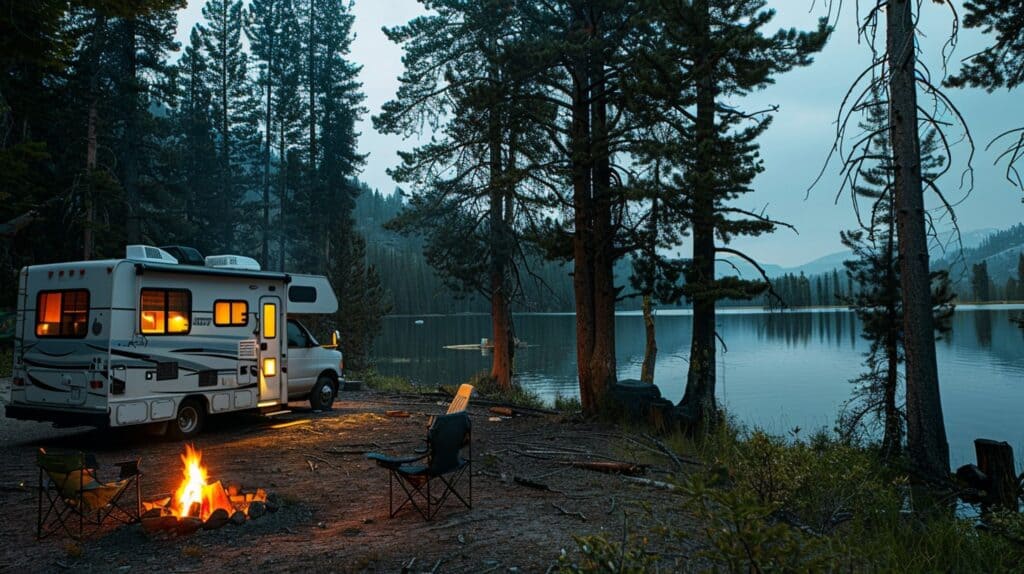
Campers bring a mix of freedom and adventure to your doorstep, but they’re not without their quirks. On the bright side, campers are easier on your wallet than most luxury RVs. They let you snug up into smaller sites with ease, making that dream spot by the lake less of a pipe dream.
You’ve got options, too – from truck bed homes to trailers that fold down smaller than a deck of cards.
Yet, it’s not all sunshine and rainbows. These road companions can be light on amenities. Think about trading your electric stove for a campfire cookout. And while they hitch up easy, driving can get tricky when the wind starts howling or when navigating through tight spots.
So if you’re itching for the open road with a touch of home comfort or just want something simple to hitch and go, take this as your sign to dive deeper!
Benefits of Owning a Camper
Owning a camper opens up a world of adventure. It’s like having a ticket to freedom on wheels. Here’s why:
- Adventure Awaits: Just hitch your trailer, and boom—you’re off. Every weekend can be a mini-vacation. No need for hotel bookings or flight tickets.
- Home Sweet Moving Home: Bring your bed, kitchen, and living room along for the ride. Forget about squeezing into tiny motel rooms.
- Wallet-Friendly Wanderlust: Compared to luxury RVs, campers are easier on the pocketbook. Spending less money on lodging means more cash for fun activities.
- Close to Nature: Park and sleep under the stars at places where hotels dare not sprout up. It’s camping without giving up all comforts of home.
- Easy to Maneuver: Unlike driving a massive motorhome, towing a camper feels less like piloting a bus through tight spaces.
- Less Maintenance Mayhem: Campers demand less upkeep than their larger counterparts, so you’ll spend more time enjoying and less time fretting.
- Versatility Victory: From solar power systems to outdoor grills, customize your camper to match your travel style without breaking the bank.
- Boats and Bikes Welcome: With an RV, it’s tricky to bring along extra toys like boats or bikes but hook them onto your camper effortlessly.
- You Call the Shots: Stay as long as you like or hit the road on a whim—no checkout times dictating your schedule here.
- Escape Plan Ready: Got an unexpected free weekend? Your camper is always there, ready for spontaneous escape from daily hustle and bustle.
- Fuel Friends Not Foes: Better gas mileage than many unwieldy motorhomes means keeping more green in your wallet and fewer stops at the pump.
- Small Space = Big Bonding: Sharing close quarters brings friends and family closer together…literally. Stories shared by the fire become memories that last forever.
As you see, embracing life in a camper comes with perks that pave the way for unforgettable journeys and soul-refreshing escapes into nature’s embrace—all without sacrificing comfort or draining savings. Step into one today; who knows where tomorrow might lead?
The Downside to Owning a Camper
Alright, so you’ve got the scoop on the sunny side of camper life. But let’s flip the coin and peek at what’s on the other side. Brace yourself; we’re diving into the downsides.
- Say hello to hitching up every time you move. Unlike RVs, campers need a bit of muscle and patience to connect to your truck or SUV. You’ll become best friends with your trailer’s hitch, spending quality time making sure it’s secure before hitting the road.
- Pack light or else. Space is at a premium in campers. You might have dreams of bringing your entire sneaker collection, but reality says pick your favorites and leave the rest at home.
- Get ready for cozy living spaces… real cozy. Think of it as getting closer to your travel buddies—literally. Campers offer less room to stretch out compared to their RV cousins, making rainy days an indoor adventure.
- Power puzzles await. Campers come with smaller electrical systems, requiring a lifeline to either a campsite’s electrical grid or a portable generator for power-hungry appliances like microwaves and air conditioners.
- Amenities? More like “a few” – menities! If you’re used to living large with full kitchens and spacious bathrooms, prepare for a gear shift. The amenities in campers are more about function than luxury.
- Count those pennies at fuel stations. While you might save upfront by opting for a camper over an RV, remember that towing affects fuel economy. Your vehicle will guzzle more gas pulling that extra weight, especially on long hauls.
- And here’s one just for kicks – becoming an impromptu weatherman because you’ll feel every gust of wind while towing a camper trailer, making highway driving an exciting test of skill (and nerve).
So there it is—the other side of camper ownership laid bare for you to consider before making that big decision.
Choosing Between an RV and a Camper
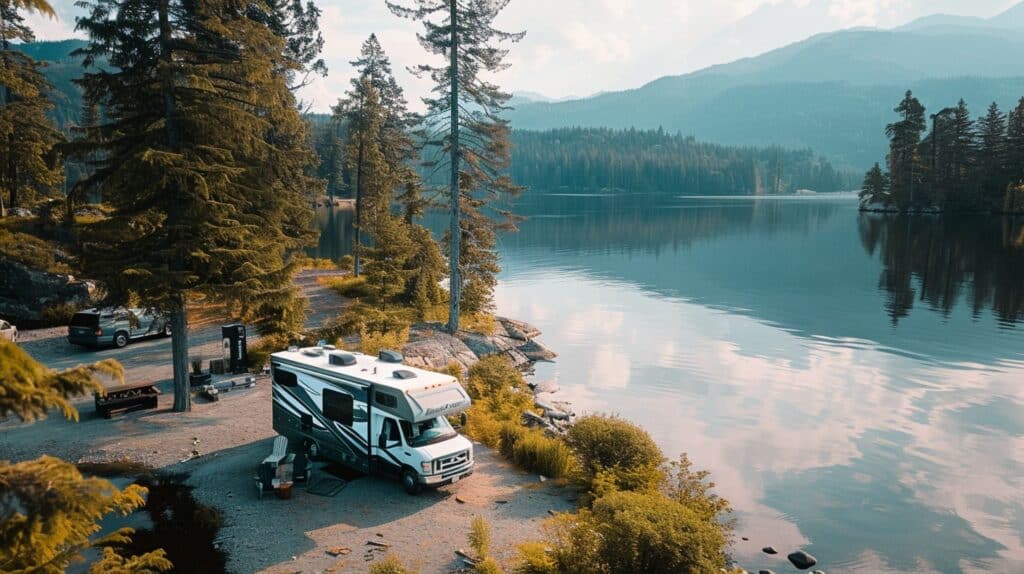
So, you’re ready to hit the road but can’t decide whether an RV or a camper suits your style? Let’s break it down. RVs, with their different classes—A, B, and C—are like rolling homes, complete with all the bells and whistles.
They’re perfect if you love driving your accommodation around and need space plus comfort. Campers, on the other hand, hitch a ride behind your vehicle. They range from simple bed-on-wheels to luxury suites on axles.
Choose campers for flexibility—they let you set up camp and still have a car to explore.
Think about what matters most to you. Is it having every creature comfort at your fingertips in an RV? Or do you prefer towing something smaller that lets you detach and roam freely in your car? Your decision might also hinge on budget considerations—RVs often cost more upfront and in upkeep than campers.
And don’t forget about where you’ll be spending most of your time! Wide-open highways scream for an RV’s ease of travels, while winding mountain roads beg for the agility of a camper setup behind your truck or SUV.
FAQs About RV vs Camper Differences
What’s the big deal between RVs and camper trailers?
Think of it this way: Choosing between an RV and a camper trailer is like deciding whether to wear sneakers or boots on a hike. Both get you there, but your choice depends on the adventure you’re after. RVs are your all-in-one road palaces, complete with living spaces and kitchens, ready to make you travel like a one-percenter. Camper trailers are more like cozy backpacks on wheels that hitch a ride behind your car, offering simplicity and flexibility.
Can I drive an RV without any special license?
You bet! Most RVs can be driven with just a regular driver’s license in hand. But here’s the kicker – if you’re eyeing one of those massive homes-on-wheels (think motorhomes or fifth-wheel trailers), check your local laws first. Some places might ask for a commercial driver’s license because of their size or weight.
How do I keep my gadgets charged in an RV or camper?
Ah, staying connected! Whether in an RV or towing a camper, keeping your devices juiced up is easy-peasy. Just plug into the power supply using the right cord for electrical outlets available at most campsites. And for those going green? Solar panels (photovoltaic cells) can turn sunlight into electric current to power up without needing to dock.
Are campers hard to tow?
Not if you match them right! Towed campers come in all shapes and sizes – from tiny pop-up trailers that almost any car can pull to hefty fifth-wheel trailers requiring more muscle (like lorries). The trick is making sure your vehicle has enough oomph based on the gross vehicle weight rating of the trailer — no sweat!
Do bigger vehicles mean better adventures?
It’s not about size; it’s how you use it! Sure, larger motorhomes offer luxury on wheels with room to stretch out, but remember they drink fuel like fish gulp water (miles per gallon can be low). Smaller van campers or pop-up trailers might skimp on space, but shine when squeezing through narrow roads or finding cozy spots off-the-beaten-path where big rigs fear to tread.
